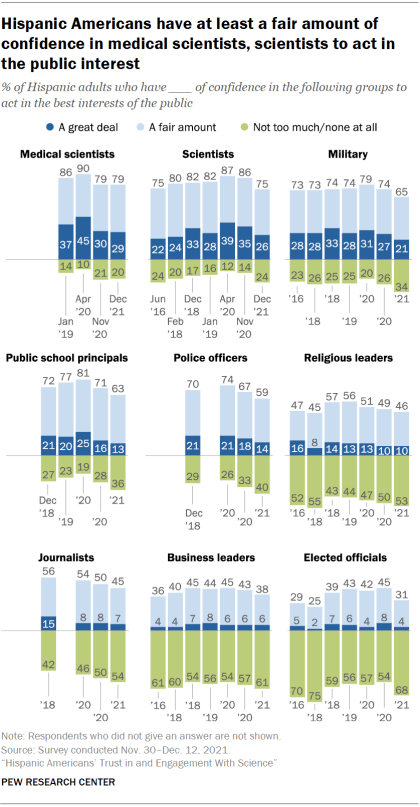
Hispanic adults have broadly positive views of medical scientists, as well as of scientists generally. Yet their views of medical research scientists – and the work they do – are nuanced, with concerns about misconduct and accountability existing alongside positive views of medical scientists as a group.
A large majority of Hispanic Americans have a great deal or fair amount of confidence in medical scientists to act in the public’s best interest. Ratings of medical scientists are more positive than those for other prominent groups and institutions in society, including public school principals, police officers and religious leaders.
On balance, Hispanic adults think that medical research scientists generally do a good job in their work, care about people’s interests and provide fair and accurate information about their research.
However, concerns about scientific misconduct and accountability also are widely held. A 57% majority of Hispanic adults describe medical research misconduct as a very or moderately big problem – higher than the share of all U.S. adults who say this. And a majority (55%) say serious cases of medical research misconduct are just as likely today as in the past, rejecting the idea that safeguards in place today will prevent serious cases of medical research misconduct.
Views of medical scientists among Hispanic adults vary across characteristics, including partisan affiliation and education. Democrats and Democratic leaning-independents hold more positive views than Republicans and Republican leaners; those with higher levels of education express greater confidence in medical scientists than those with lower levels of education. The relatively small share of Hispanic adults who say they know “a lot” about what medical research scientists do have some of the most positive views of their conduct and research.
Most Hispanic Americans express trusting views of medical scientists, scientists
Hispanic adults express more confidence in medical scientists and scientists to act in the best interests of the public than other major groups and institutions in society.
About eight-in-ten Latino adults say they have at least a fair amount of confidence of medical scientists (79%, including 29% have a great deal of confidence in medical scientists). Three-quarters of Latino adults have at least a fair amount of confidence in scientists, including 26% who have a great deal of confidence. (Half of the survey respondents were asked to rate their confidence in medical scientists, while half were asked about scientists.)
Fewer Hispanic Americans – though still a majority – have at least a fair amount of confidence in the military (65%), public school principals (63%) and police officers (59%).
Slightly fewer than half of Hispanic Americans have at least a fair amount of confidence in religious leaders (46%) and journalists (45%). Smaller minorities have at least a fair amount of confidence in business leaders (38%) and elected officials (31%).
Confidence in medical scientists and scientists has declined in the last two years among Hispanic adults, mirroring a similar trend among the general population. The share of Hispanic adults with a great deal of confidence in medical scientists declined from 45% in April 2020 to 29% in the current survey; the share with a great deal of confidence in scientists declined from 39% to 26%. Confidence in other groups and institutions have also declined in the last two years. For example, 21% of Hispanic adults have a great deal of confidence in the military, down 10 percentage points from April 2020.
Hispanic Democrats have more confidence in medical scientists and scientists to act in the best interests of the public than Hispanic Republicans
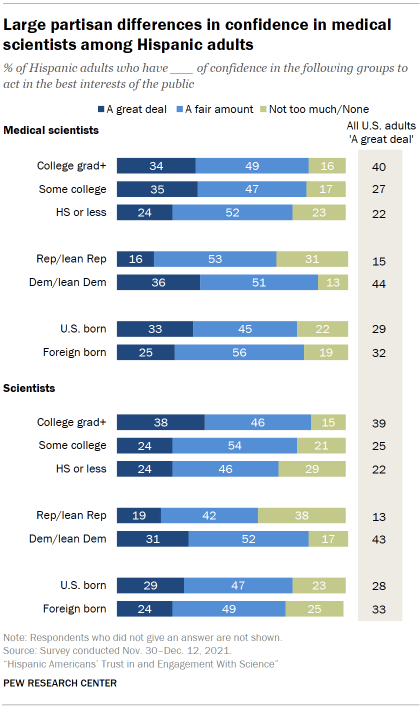
As with the general U.S. population, there are sizable differences between political groups when it comes to levels of trust in scientists. Hispanic Democrats are 20 percentage points more likely than Hispanic Republicans to have a great deal of confidence in medical scientists (36% vs. 16%).
Similarly, among Hispanic adults, 31% of Democrats have a great deal of confidence in scientists, compared with 19% of Republicans.
For both medical scientists and scientists, Hispanic adults with no college experience are less likely than college graduates to say they have a great deal of confidence in these groups to act in the best interests of the public.
Hispanic Americans see medical researchers’ competence in a largely positive light
The Center survey asked respondents to rate their levels of trust in medical research scientists across multiple dimensions in order to gain a better understanding of people’s trust in them.
Among Hispanic adults, 38% say they are confident that medical researchers do a good job all or most of the time, 40% say they do so some of the time and another 19% rate medical researchers as competent only a little or none of the time.
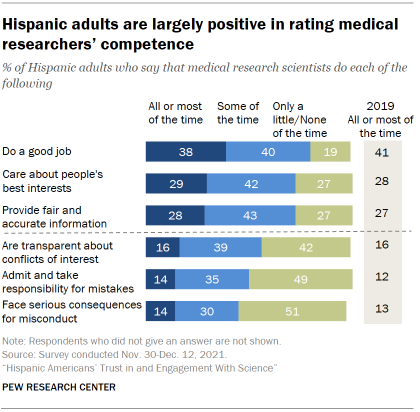
Smaller shares of Hispanic adults say that medical researchers care about people’s best interests or provide fair and accurate information all or most of the time; still, majorities rate medical researchers more positively than negatively in these regards.
Hispanic Americans’ trust in medical researchers on these dimensions of behavior are roughly the same as when last assessed in 2019. Views among the overall U.S. population about medical researchers are broadly similar.
Hispanic Americans are less trusting of medical researchers when it comes to questions of scientific integrity. As with all U.S. adults, small shares of Hispanic adults say that medical researchers are transparent about potential conflicts of interest with industry (16%) or admit and take responsibility for their mistakes when they happen (14%) all or most of the time. Should medical researchers be involved in research misconduct, few believe scientific institutions would hold them accountable; just 14% of Hispanic Americans say such researchers would face serious consequences for their misdeeds all or most of the time.
Public trust in medical research scientists varies by how familiar people are with what such scientists do. The Center survey provided survey respondents a brief description, stating: “Medical research scientists conduct research to investigate human diseases, and test methods to prevent and treat them.”
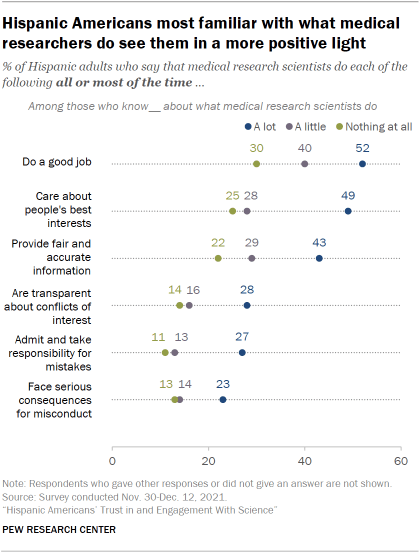
About one-in-ten (11%) Hispanic adults say they know a lot about what medical research scientists do, 54% know a little and about a third (34%) report knowing nothing at all.
Among the smaller share of Hispanic Americans who know a lot about what medical researchers do, trust in them is higher. For instance, about half of this group say that medical researchers care about people’s best interests all or most of the time. Trust in medical researchers’ caring for others is lower among those who are less familiar with the work of medical researchers.
There are also some differences by gender. Latinos tend to express greater trust in medical researchers than Latinas when it comes to their competence, caring and trustworthiness of information. Similarly, Latinos are more inclined than Latinas to think that medical researchers can be trusted to admit and take responsibility for their mistakes when they occur.
As with overall trust in medical scientists, Hispanic Democrats are more trusting of medical researchers’ competence, caring, trustworthiness of information and scientific integrity than Hispanic Republicans. There are no more than modest differences in levels of trust in medical researchers across these dimensions by nativity. See the Appendix for details.
A majority of Hispanic Americans, especially first-generation immigrants, see medical research misconduct as a problem
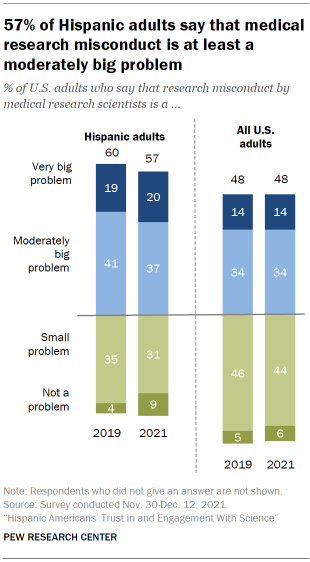
A majority (57%) of Hispanic adults say that medical research misconduct is at least a moderately big problem, with 20% saying it is a very big problem. A similar share of Hispanic adults (60%) saw medical research misconduct as at least a moderately big problem when last asked in 2019.
Hispanic adults are more likely than the general population to consider medical research misconduct at least a moderately big problem (57% vs. 48%), a pattern also seen in 2019.
Black Americans are also more likely than the general population to consider medical research misconduct a very or moderately big problem (55%). For more on Black Americans’ views about medical research misconduct, see “Black Americans’ Views of Engagement with Science.”
Concern about medical research misconduct is higher among first-generation immigrants, meaning foreign-born Latinos, compared with those born in the U.S., who are at least second-generation immigrants (62% vs 52%).
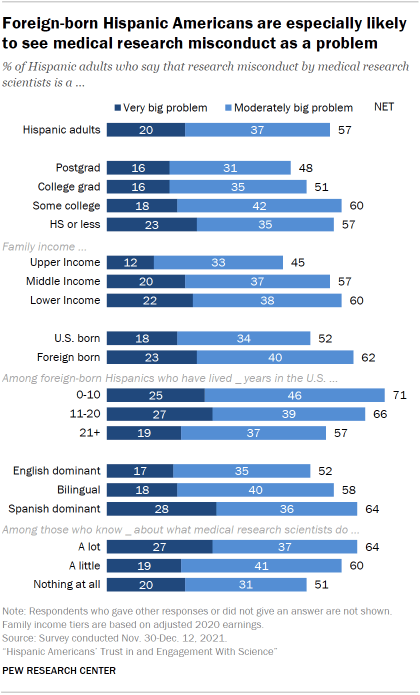
Similarly, Hispanic adults who primarily speak Spanish (64%) are most likely to be concerned about misconduct by medical researchers, followed by bilingual (58%) and primarily English-speaking Hispanic adults (52%).
Those with lower incomes and less education also tend to express more concern about medical research misconduct.
Hispanic Americans’ awareness of past research misconduct is higher among those who identify as Black
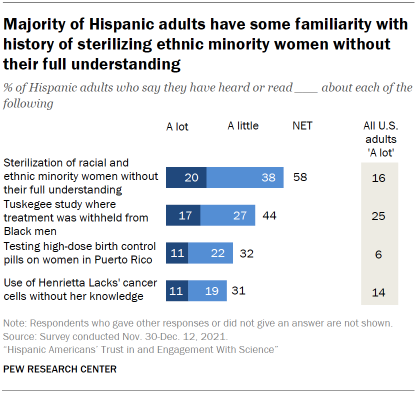
The Center survey asked respondents how much they had heard or read about a handful of past instances that involved racial and ethnic minority groups and raised ethical questions or were later found to violate ethical codes of conduct.
Hispanic Americans’ awareness of such cases was highest for medical doctors who sterilized racial and ethnic minority women without their full understanding. A majority of Hispanic adults (58%) say they had heard or read at least a little about this. Awareness about the misuse of sterilization procedures is roughly similar among the general U.S. population.
Fewer than half of Latinos (44%) say they have heard at least a little about the U.S. Public Health Service Syphilis Study at Tuskegee, commonly known as the Tuskegee syphilis study, in which syphilis treatment was withheld from Black men in the study, resulting in preventable deaths and a worsening of symptoms among study participants.
A relatively small share of Hispanic adults (3%) identify their race as Black. Among Hispanic adults who identify as Black, 61% say they’ve heard a lot or a little about the Tuskegee syphilis study, compared with fewer (42%) White Hispanic adults. Larger shares of Black than White Hispanic adults are familiar with all four cases of misconduct or alleged misconduct asked about on the survey.
One focus group participant talked about his wariness of medical research, saying,
“They used to do experiments on African Americans and minorities that were illegal experiments on us. That they told us it was supposed to lead to this outcome, but it ended up leaving us with life-threatening sicknesses. It was killing us all and they tricked us. So when you think about that, they did that to both Hispanics and African Americans. So when you know your history, that’s why it’s important to know history, you know your history, you’re not a fool and just signing up and taking and letting people put these different shots and stuff inside your body, on your will. When they’ve done stuff like this in the past and what it did to us.” – Black Hispanic man, age 25-39
About a third of Hispanic Americans (32%) say they are familiar with medical testing done in Puerto Rico using high-dose birth control pills without a full explanation of the study and its risks, which included long-term effects on fertility. Foreign-born Hispanic adults were more likely to have heard about this than U.S.-born Hispanic adults (37% to 28%). (There are not enough survey respondents in the Puerto Rican diaspora for separate analysis.)
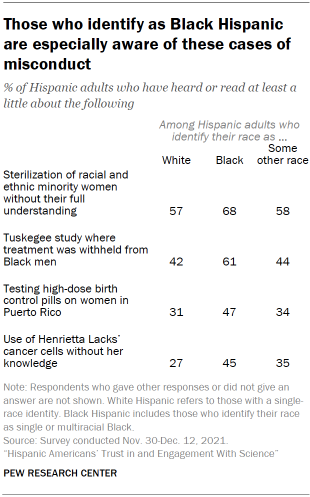
About three-in-ten Latinos (31%) say they know at least a little about the case of Henrietta Lacks, a Black woman whose cancer cells were used by medical researchers without her or her family’s knowledge or consent.
College-educated Latinos are generally more aware of these cases than those with some college or less education. Educational differences are particularly wide for awareness of the Tuskegee syphilis study: 73% of Latino postgraduates have heard at least a little about this case of misconduct, compared with 37% of those with a high school or less education. See the Appendix for details.
Overall, Latino Americans are less likely than Black Americans to have heard or read at least a little about the Tuskegee study (44% vs. 75%), the use of Henrietta Lacks’ cancer cells for research without her knowledge (31% vs. 48%) and the sterilization of ethnic minority women without their full understanding (58% vs. 68%). However, they are equally likely to have heard at least a little about the testing of high-dose birth control pills on women in Puerto Rico. For more on Black Americans’ views on science, including cases of medical misconduct, see “Black Americans’ Views of and Engagement With Science”.
Over half of Hispanic adults say research misconduct is just as likely today as in the past

In 1979, the federal government instituted a code of ethics and regulations for research conducted by the government or by organizations that receive federal funding; it was intended to prevent serious cases of misconduct, such as the Tuskegee syphilis study, from recurring.
The Center survey asked respondents for their overall judgments. Fewer than half of Hispanic Americans (40%) say that procedures in place today will prevent serious cases of medical research misconduct; a 55% majority say, instead, that research misconduct is just as likely to happen today as in the past.
The majority view is shared widely among Hispanic Americans across gender, age, education, political party and nativity.
Among the overall U.S. population, a slightly larger share (60%) say that research misconduct is just as likely to happen today as in the past.




